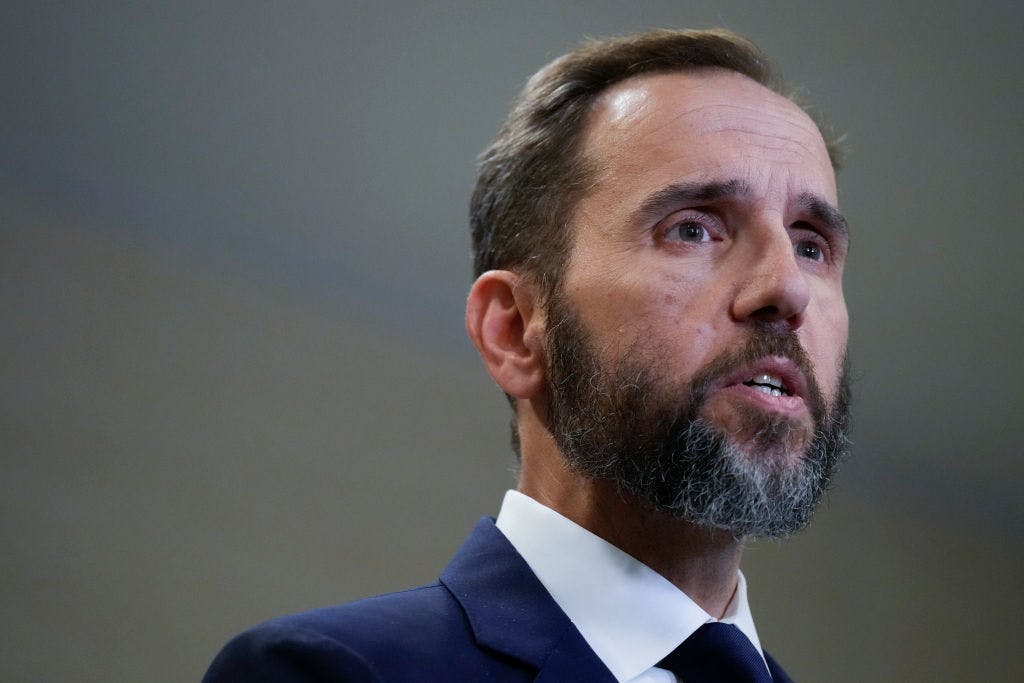Jack Smith Is Dealt a Devastating Defeat as Trump’s Mar-a-Lago Trial Is Indefinitely Delayed by Judge Cannon
With the case in disarray over ‘myriad’ issues — including an admission by the special counsel that the court was misled on the government’s handling of classified evidence — the judge pauses proceedings.

Judge Aileen Cannon’s indefinite postponement of President Trump’s Mar-a-Lago trial is a devastating defeat for Special Counsel Jack Smith’s hopes to try the 45th president before November’s election and a boost for Mr. Trump’s legal fortunes.
The judge reasons that a “finalization of a trial date at this juncture … would be imprudent and inconsistent with the Court’s duty to fully and fairly consider the various pending pre-trial motions.” She vacated a trial date of May 20, but declined to select a new one due to the “myriad and interconnected pre-trial … issues remaining and forthcoming.”
That new date, Judge Cannon writes, will arrive via “separate order following resolution of the matters before the Court, consistent with Defendants’ right to due process and the public’s interest in the fair and efficient administration of justice.” She cites the “novel and difficult questions” presented by the case.
The possibility of a postponed trial came into focus after a crucial hearing that was scheduled for Thursday was also delayed in what was possibly a warning to Special Counsel Jack Smith that his Mar-a-Lago classified documents case against President Trump is now an open, festering, and self-inflicted wound.
The May 9 hearing was intended to clarify which of the classified documents seized at Mar-a-Lago Mr. Trump and his two co-defendants — Waltine Nauta and Carlos De Oliveira — intend to use at trial. That Judge Cannon scheduled it all was a victory in a minor key for Mr. Smith, whose case has been mired in delays and whose interactions with the judge have grown increasingly fraught.
Judge Cannon’s postponement was delivered via a “Paperless Order,” meaning that she did not disclose her reasoning. It appears likely, though, that it is a response to Mr. Smith’s admission, on Friday, that scans of evidence provided to Mr. Nauta did not replicate the arrangement of the originals found at Mar-a-Lago. The special counsel also admitted that his office’s account to Judge Cannon was “inconsistent” with respect to this point.
Mr. Smith maintains that the variation in “intra-box document sequencing” has no bearing on the defendants’ ability to mount a defense. Mr. Trump’s attorney, Todd Blanche, writes in a letter to the prosecutor that his “failure to disclose the spoliation of this evidence until this month is an extraordinary breach of your constitutional and ethical obligations.” That missive was added to Judge Cannon’s docket on Tuesday.
Mr. Blanche, who is representing Mr. Trump in three of the former president’s four criminal cases, calls Judge Cannon’s attention to what he calls “discovery violations and misrepresentations to the Court by the Special Counsel’s Office.” He declares that Mr. Smith has “failed to maintain the integrity of the contents of at least some of the boxes obtained from Mar-a-Lago.”
The special counsel, Mr. Blanche declares, employed a “dismissive and condescending tone” even as he “provided full-throated but now concededly false assertions of compliance with their discovery obligations” with respect to the boxes seized at Mar-a-Lago. Courts take discovery violations seriously — turning over evidence to defendants is the government’s burden to bear — that’s in Brady v. Maryland — and failure to do so can result in a mistrial.
More trouble, though, could be ahead for the special counsel. Mr. Blanche homes in on Mr. Smith’s disclosure that the government’s so-called “filter team” was “not focused on maintaining the sequence of documents within each box.” That raises the possibility that the reordering of evidence to which the government admitted — Mr. Blanche calls it “spoliation” — was a feature and not a bug of the handling of the documents at the core of the case.
Mr. Blanche tells Judge Cannon that the government’s behavior “implicates every box at issue” in the prosecution, suggesting that Mr. Trump’s evidentiary challenges could be just getting started. The special counsel has already begun to counter Mr. Blanche’s argument that the scans provided to the defendants are “not a “reliable record of the boxes’ contents.”
The prosecutor is adamant that “where precisely within a box a classified document was stored at Mar-a-Lago does not bear in any way” on the ability of any of the defendants to mount a vigorous defense. He also calls the scans of the evidence the government has provided to Mr. Trump et al. the “best evidence available of the order the documents were in when seized.”
Judge Cannon’s postponement of the trial date means that litigation on this evidentiary question could stretch for months, amounting to the “indefinite delay” that Mr. Trump has sought from the initial filing of charges.

